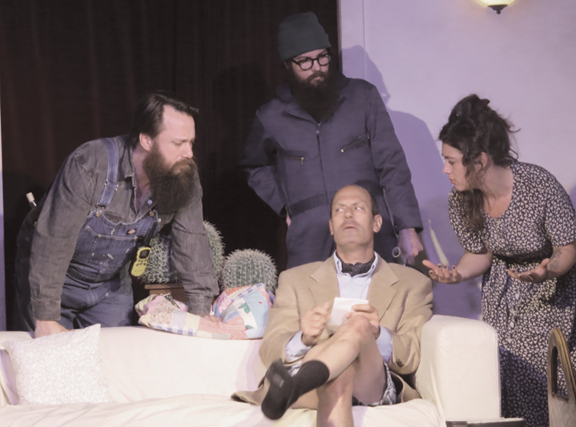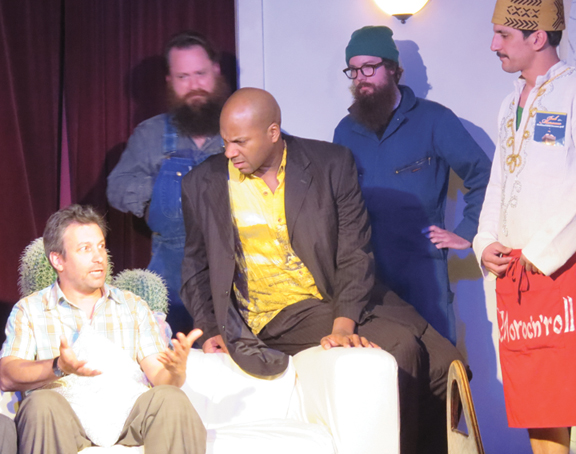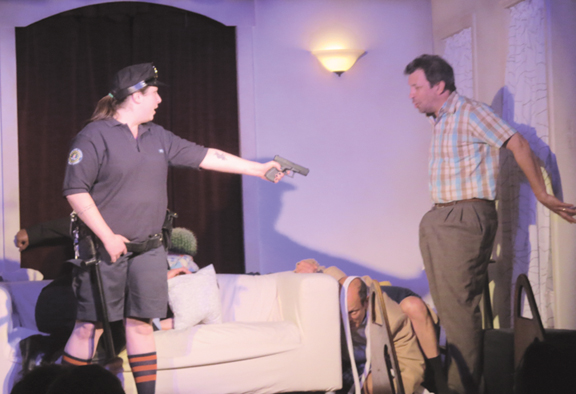Anybody up for a good penis joke? In a fast paced play, Marc Spitz’s Up For Anything creates up the scenario in the opening moments to set up two hours of back to back zingers aimed at Walter Dabney, a poet with an unrelenting erection.

The show opens with Walter (Ben Schneider) under a blanket with his mistress Annie (Jen Storch). His wife is expected home any minute from an out-of-town business trip. As Walter attempts rush Anne out the door, he reveals a staggering erection. After more love making with Annie, it lingers still.
After revealing that he experimented with Erectile Dysfunction medication, a whole host of unexpected visitors arrive for various reasons. Walter tries to conceal his predicament with a small pillow to each of them, but is eventually found out by all.
After Annie flushes an apple down the toilet, Walter’s Russian superintendent, Danzig Belknap (Geoff Wiley) arrives with Sheridan Ruggles (Arthur Aulisi), a self-proclaimed architect and neighbor. The apple caused a leak in Sheridan’s apartment. Goode (Francis Kerrigan), Danzig’s assistant, also accompanies them, proclaiming, “I saw a Dead Head sticker on a Cadillac.” Danzig explains that Goode is “not so bright” because of a tragic accident as Goode snacks on the apple that clogged the toilet.
Once Walter’s personal problem is revealed to the super, neighbor and assistant, a massive array of penis jokes are unleashed on poor Walter. Sheridan – because “if Manhattan Chase trusts [him] with their vaults” he says – convinces Walter to let him build a contraption to help “alleviate the pressure” of his massive hard-on. The contraption fails when Walter has to relieve himself.

Odean, a piano instructor, arrives shortly thereafter because Walter forgot to cancel his wife’s lesson. Odean rails about his students not practicing and then plays a tune on the piano to alleviate tension, followed by a joke he refers to as “a little pianist humor.” Next comes Ibrahim Gallagher, a delivery person with extra food he can’t deliver. Walter agrees to pay for the food to get rid of Ibrahim, but his erection reveals itself before Walter can get him out of his living room. Ibrahim quips, “Damn man, you must really like cous cous!”
Ibrahim has another solution for Walter: the power of the mind. He asks Anne, “Why don’t you think his pecker down for him?”
Walter’s editor, Peter Alderbaran (Reg Flowers) arrives in stunning fashion with a story of his own about a run in with the police. When Cheryl Klee (Maddie Bouchard) – a police officer – shows up, more drama ensues between the law and the one running from it.
Finally, Walter’s wife, Vera (Tracy Shar) arrives as Walter is shooing everyone into different rooms. During the second sexual encounter with his wife, Walter is able to orchestrate almost everyone out of his apartment without his wife noticing.
When Vera’s parents show up for lunch, everything seems to be back on track. A new tension mounts between Vera and her mother, Barbara (Haynes Thigpen). Vera’s father, Arthur Foyle (Barry O’Meara) Arthur is also a writer, a more accomplished one and does not let his son-in-law, whom he calls “Giggles,” forget it.

One by one, Walter’s new friends make their way back to the stage. Giggles tries to explain their presence away, but is quickly found out, and the play resumes its routine absurdness. The show climaxes when Annie storms back in with her adamant confession of her love affair with Walter and her blunt confrontation of Vera. Everything else in the room stops, and Annie begs, “Somebody say something!” Sheridan, who hasn’t missed a beat all day quickly chimes in. “I believe – I’ve got nothing.”
More drama ensues, and The Foyles and Vera finally leave Walter to his house guests.
Soft landing
The end of the play is less energetic and a little, um… softer than it began. And as all good things must conclude, the show ends on a more flaccid note, as self-described Walter becomes “miniscule,” “tiny,” and “barely there at all.”
Although the topic seems controversial, Spitz never takes the script to a vulgar level. Director, Carlo Vogel continued this tradition with the script, using thumbs up signs instead of other less appropriate gestures.
This farcical play emulates Christopher Durang in its wackiness. A farce is a play with over the top characters thrown into an improbable and highly exaggerated situation; Up For Anything does not exclude either of these elements.
The plot of the show is not the reason to see it. The jokes, puns and references carry the story. And with this cast, lines are delivered without flaw.
In addition to a well-written script, a farce will only work if the characters are up to the challenge. Timing must be fast-paced, and actors must embrace their characters with grandeur and oomph.
Vogel kept the energy high and added nuances to each character. Each actor played out their own story with much aplomb. They brought their own controversies and neatly joined the main plot.
Lines were delivered with punch, and despite the high drama, the audience fell quickly into the arms of the scenario. With just enough reality to keep the unbelievability suspended, we bought into not only the circumstance, but each and every character.
With lines like, “that’s as big as it gets?” (Arthur to Walter), and “this one’s got an attitude,” (Cheryl about Walter’s erection), the audience was splitting their sides with laughter from beginning to end.
Cheryl hears her police radio, but can’t find it; she spins in circles as if a dog chasing her tail.
Goode, a little mixed up at the idea of hiding from Vera, conceals himself against the wall while holding a plant to cover his face.
When things get noisy in the apartment, Belknap bursts into the apartment with Goode and screams, “Can’t you keep it down?!?” to which Walter replies, “No, I can’t!”
Peter tells his dramatic story of nearly being caught by the police with grandeur as he reveals how close he was to being caught with one handcuff around his wrist and a stolen police baton in his sock.

A raving piano instructor
Odean reverts back and forth between the gentle calm piano instructor and a raving madman who cannot cope with his students’ lack of practice.
Ibrahim is so uncouth in his resignation for his job that he is willing to deliver food to the first person that will take it – and demand payment for it.
Annie tells the crowd, “It’s sorta beautiful in its persistence – like it wants to speak.” Walter responds, “My penis has nothing to say to any of you.”
British Sheridan, a touch flamboyant and quite egotistical, turns out to be not what he has proclaimed to be throughout the majority of the play.
Barbara, who it must be noted is played by a man dressed in very unstylish drag, barbs Walter, saying, “If only the furnace still worked; you could burn your rejection letters.” She later has an unspecific sexual encounter with her daughter’s husband.
Twist, turns, and subplots are aplenty, but the ending is fairly predictable. The players never lose sight of their goals to entertain and cajole laughter from the audience. They are starkly serious throughout the hilarity of the action.
Walter seems to be the only normal character in the show, much like the plays of Christopher Durang. He becomes the butt of all jokes and the tormented by nearly all on stage. At a point of defeat and a torrent of torment, he finally accepts his new circumstance and his fate. The audience can believe the story because Walter keeps us grounded in reality, while chaos swirls madly around him.
In the second act, more conflicts begin to appear on stage, complicating the role of each character. Arthur and Walter verbally spar over their writings. To escalate things, Peter gains the commission of Arthur, even though he is Walter’s agent.
Vera and Barbara compete against each other, beginning with the challenge to Walter to guess Barbara’s age.
Peter also realizes his very physical relationship with Cheryl is not symbiotic when their personalities clash. She is after all a cop, and Peter is on the run.

And of course, Walter’s marriage is divulged as a sham when Annie makes her announcement of the affair.
The actors are true to their roles, never exposing subplots and secrets until the moment of revelation. Timing is a big building block, and Vogel has it dead on. From the opening seconds, the audience is drawn in, and until the curtain closes we are amused until we hurt, and then some.
Vogel even carries this jovialness into the program of the show. Bios of the cast and crew are short, quirky one-liners that amuse the audience even before the curtain parts.
Aulisi “lives on the tiny island of Manhattan and is quite tan.”
O’Meara is “the proprietor of Bait and Tackle where they continue not to sell any bait.”
Vogel himself is “a double Gemini, if that counts for anything.”
The show ran at Jalopy Theatre for four sold-out performances in late March. Vogel plans to revive the show in the fall.
He offered the Star-Revue one pertinent answer. “The erection isn’t real,” he says, sparing Schneiderman the same embarrassment of his character, Walter.









One Comment
Reblogged this on The Red Hook Star-Revue and commented:
A Stand Up performance, review by Kimberly G. Price